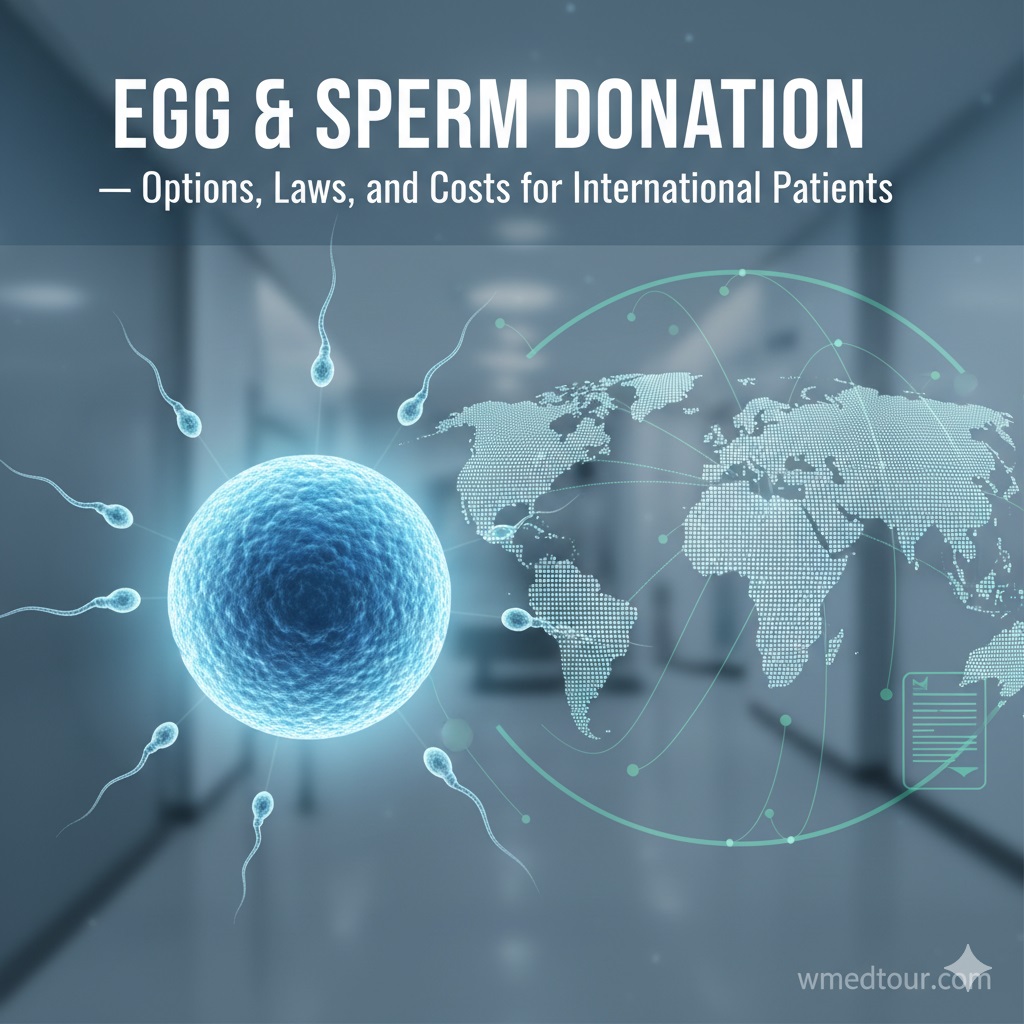👨👩👧 Counseling & Informed Consent for Gender Selection and IVF: Navigating the Ethical and Medical Landscape
Executive Summary
Gender selection, primarily through Preimplantation Genetic Testing for Aneuploidy (PGT-A) during an In Vitro Fertilization (IVF) cycle, helps many families with family balancing. Gender Selection IVF Consent represents an essential and non-negotiable step in this journey. This process deeply intertwines with complex ethical, legal, and emotional considerations. Consequently, counseling and Gender Selection IVF Consent are not merely administrative hurdles; they are fundamental, mandatory steps. These steps ensure prospective parents fully grasp the psychological, societal, and medical ramifications. This comprehensive guide details the crucial steps of pre-treatment assessment, in-depth genetic counseling, and the strict requirements for genuine informed consent across the global healthcare landscape, particularly for medical travelers.
📚 The Essential Role of Counseling in Ethical Gender Selection IVF Consent
The journey toward family balancing using advanced reproductive technologies like IVF and PGT-A is significant. It involves making decisions with long-term impacts. Therefore, a robust counseling process is vital. This is not simply a formality; on the contrary, it provides a dedicated space for thorough psycho-social and genetic evaluation. This ensures parents make the choice thoughtfully, responsibly, and without coercion. Thus, it’s an indispensable precursor to securing proper Gender Selection IVF Consent.
For individuals pursuing treatments abroad, like fetal gender selection, navigating diverse ethical and legal frameworks presents a challenge. Professional counseling helps bridge this gap, offering clarity on regulations, success rates, and potential emotional consequences. Consequently, this comprehensive approach is paramount for patient well-being and achieving truly informed Gender Selection IVF Consent.

👤 Psychological and Social Counseling
Psychological counseling delves into the deeper, often unarticulated motivations behind the desire for a specific gender. It explores the societal pressures, cultural expectations, and the potential psychological impact on the resulting child. Crucially, counselors assess for any underlying issues that could lead to gender disappointment if the process fails, or if the child develops a non-conforming gender identity later in life. Furthermore, they help establish realistic expectations.
- Assessing Motivation: Understanding the root cause of the family balancing desire.
- Addressing Gender Disappointment: Preparing parents for the emotional reality that the procedure might fail or that they might not achieve the desired emotional outcome.
- Exploring Societal Implications: Discussing the broader impact on the family unit and the child’s place in society. This step underscores the gravity of decisions related to Gender Selection IVF Consent practices worldwide.
Consequently, the dialogue steers toward promoting unconditional love and acceptance, irrespective of the child’s final characteristics or development. Additionally, this ensures long-term parental success.
🧬 Genetic and Medical Counseling
Medical and genetic counseling focuses on the specifics of the procedure itself. This involves a clear, non-technical explanation of the IVF process, how PGT-A works to determine gender, and the associated risks. Furthermore, understanding the PGT-A testing process and its accuracy is fundamental for a truly informed decision. Moreover, counselors cover all aspects of PGT-A testing.
- Procedure Overview: Detailing the steps of IVF, embryo creation, and biopsy for PGT-A. Interested patients can read more about the IVF process ultimate step-by-step guide.
- PGT-A/PGT-SR Risks: Explaining the minor risk of embryo damage during biopsy, the chance of a misdiagnosis (though very low), and the possibility of not having viable embryos of the desired gender for transfer.
- Success Rates: Providing realistic, evidence-based success rates for the entire IVF-PGT-A cycle, not just the accuracy of the gender identification itself.
📜 Decoding Informed Consent for Gender Selection IVF Consent
The legal and ethical requirement for Gender Selection IVF Consent proves significantly more rigorous than for standard IVF. Because the procedure is elective and potentially controversial in certain jurisdictions, the patient’s consent must be unequivocally voluntary, competent, and fully informed. As a result, securing the correct Gender Selection IVF Consent requires strict documentation.
🔎 Key Elements of True Informed Consent
Consent should cover a broad spectrum of information, ensuring no stone remains unturned. Since PGT-A is the method of choice for this treatment, the consent form must reflect the specifics of genetic testing. This is why thorough counseling and robust Gender Selection IVF Consent are inseparable. Consequently, clinics must provide clear, concise documentation.
- Voluntariness: The decision must be free from coercion, pressure from a partner, family, or the medical team.
- Competence: The individuals must have the legal and psychological capacity to understand the information and make a rational decision.
- Information Disclosure: Clinicians must disclose all relevant facts—including alternatives, benefits, risks, costs (see cost of fetal gender selection 2025), success rates, and consequences—in an accessible language.
- Understanding: The clinician must verify that the patient actually understands the disclosed information, often using a ‘teach-back’ method.
Moreover, the discussion must explicitly address the disposal or donation of embryos of the non-selected gender. This is a profound ethical component that must be agreed upon and documented in the consent form. This process aligns with the broader goal of patient autonomy, a cornerstone of ethical practice. As a result, robust documentation of the consent process is absolutely necessary.
🌐 Global Regulatory Divergence
We must acknowledge the legal patchwork governing gender selection globally. While some countries permit it for family balancing, many others, particularly in Europe, have outright bans, allowing it only for medical reasons to prevent serious X-linked diseases. Individuals traveling for care must understand that the legality of Gender Selection IVF Consent is country-specific. Therefore, understanding local laws is vital. This is particularly relevant for medical travelers researching global medical treatment regulations guide.
NOTE: Traveling for gender selection to a country where it is legal does not necessarily grant ethical approval. Patients must reconcile the legal opportunity with their own ethical framework. Consequently, this is a critical discussion point during counseling.
🔯 Pros and Cons: Gender Selection IVF Consent Process
Understanding the dual-sided nature of the informed consent process is crucial for both patients and providers. It aims to maximize patient understanding while mitigating future legal and emotional complications. Therefore, every clinic should review this balance.
| Feature | ✅ Pros (Benefits) | ❌ Cons (Challenges) |
|---|---|---|
| Comprehensive Counseling | Mitigates future psychological distress and gender disappointment. Ensures ethical decision-making and non-coercion. | Can feel intrusive or lengthy for patients eager to start treatment. Adds to the overall cost of the fertility journey. |
| Detailed Informed Consent | Provides legal protection for both patient and clinic. Upholds patient autonomy and right to self-determination. Ensures clarity on embryo disposition. | Complex legal terminology can overwhelm patients. The necessity of a ‘cooling-off period’ might delay treatment unnecessarily for some. |
| Ethical Oversight | Maintains the moral integrity of the fertility clinic and the medical field at large. Protects against potential societal abuses of the technology. | Leads to highly restrictive or prohibitive laws in some countries, limiting access for family balancing purposes. |
💡 Case Study: The Journey of Mr. and Mrs. K (Family Balancing)
The Initial Scenario
Mr. and Mrs. K, a couple from a country with a strict ban on elective gender selection, sought our assistance for family balancing. They already had three healthy daughters and intensely desired a son to feel their family was ‘complete,’ driven primarily by cultural and familial pressure. They chose to travel abroad for gender selection methods involving IVF and PGT-A.
The Counseling & Consent Process
Initially, they focused solely on the success rate. However, our mandated psychological counseling session spent significant time exploring the intensity of their desire and the familial pressure. The counselor identified an underlying anxiety: the fear of disappointing their extended family. The counseling shifted its focus from the gender to the health and well-being of any future child. As a result, their outlook changed significantly.
The genetic counselor then meticulously explained the PGT-A process, noting that of the 12 embryos retrieved, only 5 were euploid (genetically normal), and of those, only 2 were male. The final, signed Gender Selection IVF Consent document specifically outlined the risk of a failed transfer and the ultimate decision regarding the remaining three female embryos (they chose to donate them for research). Therefore, the clinic addressed all ethical issues before proceeding.
The Outcome
The first transfer of a male embryo succeeded. While elated, the couple reported that the counseling process had fundamentally changed their perspective. They realized external factors had disproportionately influenced their desire. Subsequently, they became vocal advocates for mandatory psychological screening in fertility treatments, stating that the extensive fertility treatments pre-travel checklist and counseling prevented them from placing unfair expectations on their future son.
🏥 Who is This For?
The stringent requirements for counseling and documented Gender Selection IVF Consent are essential for several groups:
- Prospective Parents Seeking Family Balancing: Those with existing children of one gender wishing to have a child of the other gender, often for non-medical, elective reasons.
- Patients with Medical Indications: Couples with a history of X-linked genetic disorders who need to select a specific gender to prevent disease transmission. For them, PGT-SR/PGT-M is the relevant procedure, making preimplantation genetic testing a medical necessity.
- International Medical Travelers: Individuals traveling for fertility care must navigate different legal landscapes. Due to the high-stakes nature and costs involved, like those detailed in a global medical tourism guide 2025, a thorough understanding of the procedure and local law proves critical.
- Fertility Professionals: Clinicians, nurses, and genetic counselors who need to uphold the highest ethical standards of practice, ensuring every patient’s decision is fully autonomous and well-considered.
📈 Comparison: Elective vs. Medical Gender Selection
While the procedure (PGT) is similar, the ethical and consent parameters differ significantly between elective (family balancing) and medical selection. Consequently, the requirements for Gender Selection IVF Consent vary by indication.
| Feature | Elective (Family Balancing) | Medical (Disease Prevention) |
|---|---|---|
| Primary Rationale | Personal/Social preference; completing the family. | Preventing the transmission of a serious X-linked or Y-linked genetic disorder. |
| Ethical Complexity | High. Concerns about sex discrimination, gender bias, and resource allocation. | Low. Accepted as a morally permissible use of PGT to protect the child’s health. |
| Legal Status | Highly variable (legal in USA, many Asian countries; banned in many European countries). **Normal Outbound Link:** Study on Germany’s regulatory stance (University of Bremen) | Generally legal worldwide, pending government review. |
| Counseling Focus | Psychological motivation, avoiding gender disappointment, future societal impact. | Genetic risk assessment, residual risk of misdiagnosis, long-term family planning. |
| Informed Consent | Extremely detailed and often requires a mandated cooling-off period. | Standard PGT consent covering diagnosis accuracy and procedural risks. |
Furthermore, regardless of the reason, fetal gender selection risks and success rates information fully covers the overall process, including the specifics of PGT-A testing. Consequently, all patients receive the same baseline information.
📋 Navigating the IVF-PGT-A Process with Integrity
The IVF-PGT-A procedure maintains its integrity through several mandatory steps that precede the actual embryo transfer. These steps demonstrate a commitment to ethical practice and the comprehensive provision of counseling leading to documented Gender Selection IVF Consent.
📖 Step 1: Initial Consultation and Screening
Following a review of basic fertility health (see fertility problems ivf abroad), an initial consultation sets the stage. The medical team outlines the timeline, the required medical visa process (view our medical visa definitive patient handbook), and preliminary cost estimates. Most notably, the doctor must confirm that the request is for PGT fetal gender selection (family balancing) and not merely for sex determination. Moreover, they address all pre-treatment logistics.
The screening must also address existing cultural or ethical frameworks. For example, in parts of the world with prevailing societal gender preferences, the clinic must intensify counseling. This ensures the parents can genuinely accept a child of the non-selected gender in the event of unforeseen outcomes. Therefore, cultural context is always considered.
💬 Step 2: Mandatory Genetic and Psychological Counseling
This critical phase involves separate sessions with a specialized genetic counselor and a psychologist. The genetic counselor uses authoritative resources to explain the science, like this information on fetal gender selection success rates. The psychologist assesses the suitability, as previously mentioned. This two-pronged approach ensures that patients make decisions that are both scientifically literate and emotionally sound. As a consequence, patients are thoroughly prepared.
A significant part of the genetic discussion involves reviewing the current literature on PGT-A, confirming its role primarily as a test for aneuploidy (chromosomal abnormalities) and secondarily as a method for gender identification. The scientific community has long debated the ethical implications of using a medically advanced technology for elective purposes, as highlighted in studies on assisted reproduction ethics. **Normal Outbound Link:** Ethics and Regulation of Preimplantation Genetic Diagnosis (Stanford University). This discussion reinforces the importance of ethical Gender Selection IVF Consent.
🗂️ Step 3: The Informed Consent Documentation
This step involves the physical signing of a detailed document. This form must explicitly state that the couple understands:
- The purpose of the PGT-A for gender selection.
- The number of IVF cycles potentially required (see ICSI treatment global cost 2025).
- The disposition of all remaining embryos (storage, donation, or discard).
- The non-transferability of the consent—it applies only to the current clinic and procedures. **Nofollow Outbound Link:** Informed Consent Guidelines for Assisted Reproductive Technologies (ASRM).
Furthermore, clinics often enforce a mandatory ‘cooling-off’ period between the counseling session and the signing of the final Gender Selection IVF Consent form. This ensures patients do not make the decision rashly but with a clear mind, reinforcing patient autonomy. Therefore, the consent is truly informed.
🎯 Step 4: Embryo Biopsy and Gender Confirmation
Once the IVF cycle is complete, embryos develop to the blastocyst stage. A highly skilled embryologist performs a biopsy, removing a few cells (trophectoderm) for genetic analysis. The PGT lab then confirms the gender and ploidy status (chromosomal normalcy). The clinic clears only euploid embryos of the desired gender for transfer. Detailed information on this can be found in a guide to new methods in IVF in 2025. Subsequently, the transfer is scheduled.
🏅 Step 5: Embryo Transfer and Post-Procedure Counseling
The clinic transfers the selected embryo. Successful implementation of the Gender Selection IVF Consent process does not end here. The clinic offers post-procedure counseling to help the couple manage the two-week wait and the emotional outcome, whether it’s a successful pregnancy or a failed cycle, which might lead them to consider options like egg donation ivf process guide. Therefore, continued support is vital.
This includes resources for managing anxiety and preparing for the ethical discussions that may arise with family and friends. This final step emphasizes that the patient’s psychological welfare remains a priority long after the procedure is complete. To provide credible context on emotional support, we rely on established psychological research. **Nofollow Outbound Link:** Psychological Impact of Infertility and Assisted Reproduction (Harvard Medical School). Ultimately, the goal is successful family completion.
🌍 Global Ethical Perspectives on Gender Selection
The practice of elective gender selection highlights a significant schism in global bioethics. Ethical bodies and governments around the world take markedly different positions, which directly influence the requirements for obtaining Gender Selection IVF Consent.
- Western Europe: The vast majority of countries, including the UK, Germany (see medical travel germany 2025 ultimate guide), and France, prohibit gender selection for non-medical reasons. Concern primarily focuses on gender bias, sex-selection resulting from cultural preference, and potential societal imbalance. The focus remains strictly on preventing severe genetic conditions.
- North America & Australia: These regions generally permit gender selection for family balancing, but they mandate strict ethical guidelines, robust counseling, and detailed Gender Selection IVF Consent. Clinics face heavy scrutiny if they fail to follow these protocols. **Normal Outbound Link:** Ethical Considerations in Sex Selection (Georgetown University Kennedy Institute of Ethics).
- Asia & The Middle East: Many countries allow it, often due to strong cultural preferences for a balanced family or a child of a particular gender. Medical tourism centers in places like Turkey (learn more via medical tourism turkey ultimate guide 2025) and certain parts of the Middle East see a high volume of requests. This makes the counseling and consent process even more crucial to ensure ethical treatment. Medical tourism iran 2025 ultimate guide also outlines local practices.
This global variance means patients must not only understand the medical procedure but also the ethical lens through which the host country views their decision. An extensive checklist for choosing a surgeon and clinic abroad should always include a review of the clinic’s ethical board and consent processes. Consequently, this step adds an important layer of due diligence.
Ultimately, a clinic that insists on thorough counseling and documentation for Gender Selection IVF Consent signals its commitment to global best practices. It prioritizes patient welfare and ethical responsibility over mere commercial gain. This authoritative stance confirms that WMedTour only works with institutions upholding these strict standards. For more on the ethical debate, you can review this research. Fetal gender selection ethics guide.
❕ Frequently Asked Questions (FAQ) on Gender Selection, Counseling, and Consent
The process of obtaining counseling and proper Gender Selection IVF Consent generates many complex queries. Therefore, here are answers to the most-asked questions we receive:
Yes, mandatory psychological and genetic counseling is a non-negotiable requirement in almost all reputable clinics worldwide before proceeding with full informed consent. This is not to question your decision but to ensure you are fully aware of all psychological, ethical, and medical ramifications, and to confirm the decision is truly autonomous and informed. The process helps mitigate the risk of future emotional distress, such as fertility problems and ivf abroad.
While it varies by clinic and country, a standard cooling-off period typically lasts 24 to 72 hours after the final counseling session and before signing the final consent document. This time allows prospective parents to reflect on the gravity of their decision without immediate pressure, thus ensuring valid Gender Selection IVF Consent.
No. Non-Invasive Prenatal Testing (NIPT) or simple blood tests can determine the fetus’s sex during pregnancy, but they do not allow for selection or manipulation of the embryo’s gender before implantation. PGT-A during an IVF cycle is the only medically accepted method for gender selection prior to pregnancy, as explored in the pre-conception gender selection guide.
The disposition of non-selected embryos is a crucial part of the counseling and Gender Selection IVF Consent process. Options generally include: cryopreservation for future use, donation to another couple, donation for scientific research, or discarding them. The couple’s chosen option must be clearly documented in the consent form.
The slight inaccuracy (around 1%) typically results from a phenomenon called “mosaicism” (where some cells have a different genetic makeup than others), or a slight technical error in the biopsy/testing process. Genetic counseling always discusses this small possibility as part of the consent process.
Extensive research, including studies from leading fertility associations, suggests that the embryo biopsy required for PGT-A does not increase the risk of adverse long-term health or developmental outcomes for the child compared to children born from standard IVF. **Nofollow Outbound Link:** Long-term safety of PGT-A (Oxford University Press Academic). Furthermore, this is a key discussion point in the Gender Selection IVF Consent briefing.
In a medical context, people often use them interchangeably, but “sex” selection refers to the biological chromosomes (XX or XY), while “gender” selection is the common, broader term for the elective choice. Medically, PGT-A performs biological sex selection. Ethical counseling addresses the psychosocial implications of gender identity.
Yes, clinics typically bill specialized genetic and psychological counseling sessions separately, and they do add to the total treatment cost, as seen in cost of fetal gender selection 2025 information. However, given their mandatory and critical nature, they are an unavoidable investment in the ethical and emotional success of the treatment. Consequently, they are a vital expense.
Reputable medical tourism facilitators and clinics (like those WMedTour partners with, see all locations) provide counseling services in multiple languages, often through accredited medical interpreters. This ensures a complete and legally sound Gender Selection IVF Consent.
MicroSort (sperm sorting) was another method, but it is less effective and no longer widely practiced. PGT-A during an IVF cycle is the most accurate, reliable, and ethically regulated method for gender selection, as detailed in our guide on gender selection methods 2025.
Patients maintain the right to withdraw their consent at any stage before the embryo transfer. If patients withdraw consent, the clinic typically reverts to transferring a non-gender-selected euploid embryo, or the couple can choose to cryopreserve all remaining embryos. The Gender Selection IVF Consent document must also clearly outline this process.
Yes, high-quality counseling proactively addresses this common ethical concern. While gender selection is generally viewed as a less morally charged choice than selecting for non-medical traits like height or intelligence, the discussion forms part of the overall ethical responsibility outlined in the consent process. **Normal Outbound Link:** The Ethics of ‘Designer Babies’ and Genetic Selection (The Hastings Center). Ultimately, all ethical concerns are covered.




